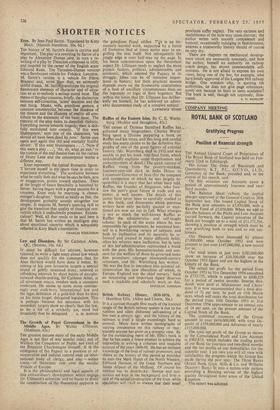SHORTER NOTICES THE history of M. Sartre's Kean is curious
and important. The play is a rewriting by Sartre of a • play by Alexandre Dumas pert, in turn a re- writing of a play by Theaulon composed in 1836, and inspired by the career of the English actor Edmund Kean. The Theaulon-Dumas version, was a flamboyant vehicle for Frederic Lemaltre.
M. Sartre's version is a vehicle for Pierre Brasseur and, more lion that, an extremely skilful drama. M. Sarta,,transforrns the original flamboyant elements of character and of situa- tion so as to embody a serious moral issue. The theme of the play concerns, briefly, the distinction between self-conscious, 'acted' emotion and the real thing. Masks, veils, grandiose gesture, a constant counterpoint' between the illusions of the theatre and the illusions of ,reality all con- tribute to the statement of the basic issue. The rhetoric of the play exists to demolish rhetoric.
Everything moves towards tragedy, then is skil- fully modulated into comedy. If this were Shakespeare,' says one of the characters, 'we
should all have been .dead by now.' Sartre uses again and again this old and eternally fruitful
device: 'If this were Shakespeare .. .', 'Now if this were a play . 'Ah, sir, what an exit,' or the curtain of the real theatre rises on the curtain of Drury Lane and the counterpoint works a different way.
Kean represents the typical Romantic figure: 'I torture myself in my spare time in order to experience everything.' The confusion between what he really feels and what he says he feels, acts or exaggerates, points toward madness. Then at the height of fiasco Sensibility is banished by Sense: having begun with a grand passion for a countess, Kean ends by marrying 'a cheese- monger's daughter.' Stated as baldly as that, the development probably sounds altogether too simple: It requires M. Sartre's unerring skill to give the transition that quality of theatrical con- viction which it undoubtedly possesses. Existen- tialism? Well, all that needs to be said here is
that M. Sartre has written an intelligent play about emotional sincerity .which is adequately reflected in Kitty Black's translation.
CHARLES TOMLINSON










































 Previous page
Previous page